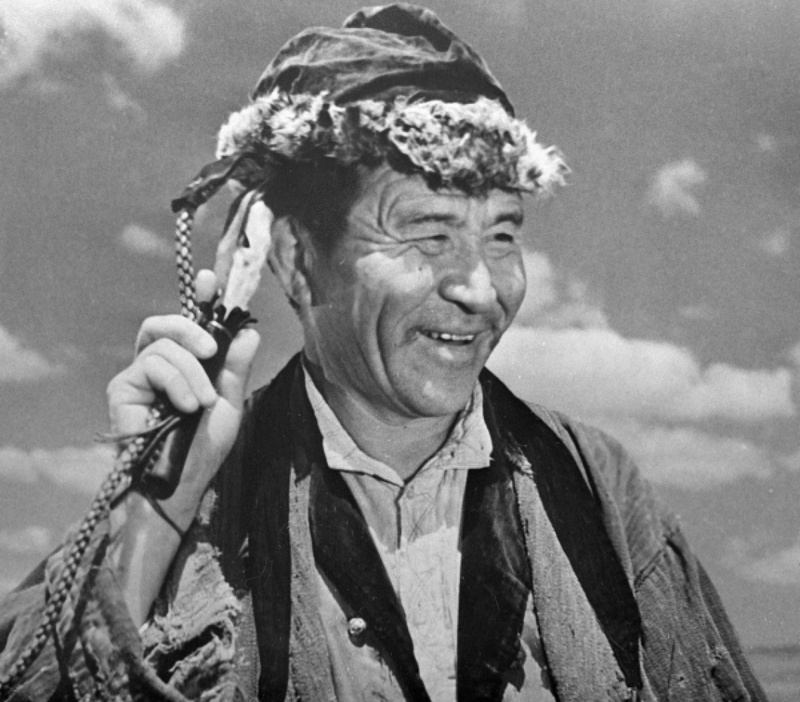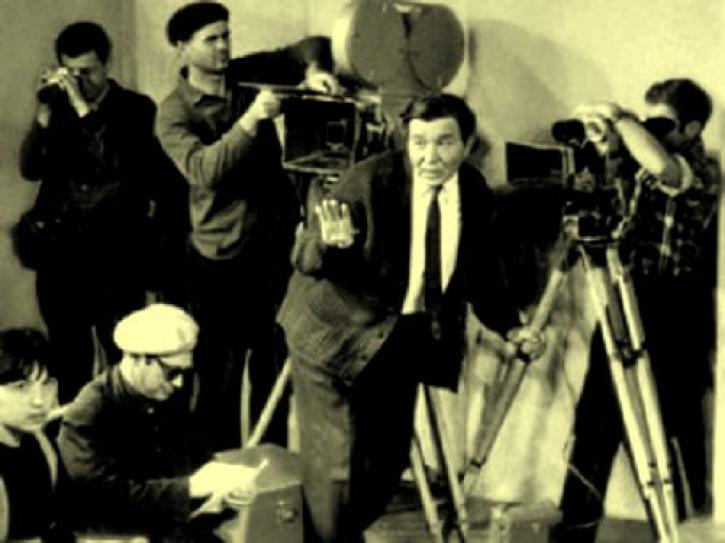Shaken Kenzhetaiuly Aimanov is the Kazakh actor, theater and film director, People’s Artist of the USSR, winner of the Stalin Prize and the State Prize of the Kazakh SSR. Also, he is the founder of the Kazakh cinema and had a great influence on the formation of the national theater.

Shaken Aimanov was born on February 15, 1914 in Bayanaul (modern Pavlodar region) in the family of a peasant cattle breeder.
He graduated from high school in 1928. In 1931-1933, he studied at the Kazakh Pedagogical College in Semei.
In 1933, at the invitation of writer Gabit Musirepov, he came to Almaty and was accepted into the troupe of the Kazakh Drama Theater. In 1947-1951, he was the chief director and artistic director of this theater, where he worked until 1953. He had staged many performances, including “Talents and Fans” by A. Ostrovsky and the “Tragedy of the Poet” by G. Musirepov. He played over a hundred roles in the theater, including Petruchio (“The Taming of the Shrew”), Khlestakov (“The Inspector”), Kodar (“Kozy Korpesh – Bayan Sulu”).
Since 1938, he has been acting in the films.
“I love theater, but theater cannot reach as many spectators as cinema. The performance takes place in one theater, at best in several. And, the film is watched by tens of thousands”, - stated Shaken Aimanov.
In 1940, the director of Lenfilm, M. Levin, invited him to play Sarsen in the “Raikhan” film. Then, Aimanov played a front-line soldier in the “White Rose” film, the role of Abai Sharip’s pupil in the “Songs of Abai” film, the role of Dossanov in the “Golden Horn” movie.

Other than this, Aimanov tested himself in different roles. The film “Our dear Doctor ” (1957) brought him a wide fame in the USSR, in which Aimanov proved himself both as a film director and an actor, and in “The Beardless Deceiver” (1964) film, he co-wrote the script, directed and starred as well. Aimanov had used the cameo element in his film for the first time. A plot of the “Angel in a skullcap” (1968) movie was based on a real-life case, when his relative was looking for a bride for her youngest son.
Shaken Aimanov is rightfully called the founder of Kazakh cinema. In the period from 1954 to the 1970s, Shaken Aimanov directed 11 films. A phenomenon of the great Shaken Aimanov was that he had been the first film director in the Kazakh cinema, who shot the films in all known genres. He created the popularly beloved comedies “Aldar Kose” (“The Beardless deceiver”), “Angel in a skullcap”, the musical comedy “Our Dear Doctor”, the “Land of the Fathers” drama, “The End of the Ataman” (Chieftain) action adventure, “A poem about love” melodrama, etc.
As part of a cultural exchange, Shaken Aimanov led a Soviet delegation of the cinematographers during a trip to the Egyptian capital – Cairo.
At the First International Film Festival in Moscow, he took part in a dance competition with an American film star Elizabeth Taylor and the couple won the first place. Back there, in 1963, according to an unspoken directive, a Soviet film was supposed to win at the festival. But the jury was divided. The decisive vote was cast in favor of the popular Italian director Federico Fellini. This voice belonged to the film director Aimanov.
In 1964, he read Othello’s monologue at the celebration of the 400th anniversary of William Shakespeare in England, and this was the first time that Shakespeare had sounded in Kazakh at the English stage.
Since 1963, he had been the first secretary of the Board of the Union of Cinematographers of the Kazakh SSR.
He was elected as the Deputy of the Supreme Soviet of the Kazakh SSR of the 4th and 7th convocations.
Unfortunately, Shaken Aimanov tragically died in a traffic accident in Moscow on December 23, 1970. He was buried in Almaty at the Central Cemetery.
In many cities of Kazakhstan, the streets are named after Shaken Aimanov, as well as the main Kazakhfilm studio in Almaty. The memorial plaques have been installed at the house, where a great director lived and on the building of the film studio.




